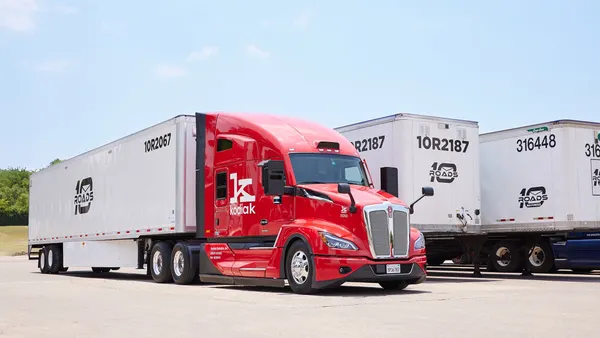Dive Brief:
- Transplace, a TMS and logistics technology provider, has acquired ScanData, a parcel transportation management system (PTMS) company, according to an announcement Tuesday. The terms of the deal were not disclosed.
- Transplace specializes in truckload and cross-border freight brokerage, while ScanData's PTMS is designed for high-volume parcel shippers, according to the release.
- Acquiring this PTMS capability will allow Transplace to better support "shipper’s growing eCommerce/DTC needs," Frank McGuigan, chief executive officer of Transplace, said in a statement.
Dive Insight:
The coronavirus pandemic has upended normal parcel and freight volumes across the country. In a recent report, DHL said it experienced peak season volumes in April due to sharp increases in e-commerce packages, with domestic volume up by 36% and cross-border numbers up by 28% compared to February daily averages.
This pandemic-driven increase in e-commerce demand is a trend that could be here to stay, some experts say, and has resulted in supply chain managers rethinking their networks and incorporating digital tools in order to adjust to new realities.
"TMS systems were originally designed for a B2B world, but now virtually everyone has a B2C channel," Brad Forester, managing partner at JBF Consulting, told Supply Chain Dive via email. "Covid-19 has accelerated this push towards B2C, and now TMS providers like Transplace are trying to catch up."
A PTMS system fills a key gap for Transplace, Forester said, as most other enterprise TMS companies don't have tools to help high-volume shippers manage parcel and courier logistics.
ScanData's platform allows shippers to automate distribution center processes including sorting and conveyor belt assignments, manifest generation and package labeling. In addition, it allows shippers to assign parcels to carriers based on certain requirements including cost, transit time, temperature control needs and shipment method, all from a centrally managed system that shippers can integrate into their existing visibility tools, according to ScanData's website.
These features are crucial for shippers as they see potentially see increasing demand in their e-commerce channels. "Visibility and carton-level tracking are very different from a traditional 'bill of lading' driven model seen in [truckload] and [less-than-truckload]," Forester said.
Shipping higher volumes of more geographically-distributed cargo (which is the case with residential deliveries, for example), as opposed to bulk freight sent to a single destination, presents cost and network management challenges that traditional TMS "isn't well architected to support," he said.














